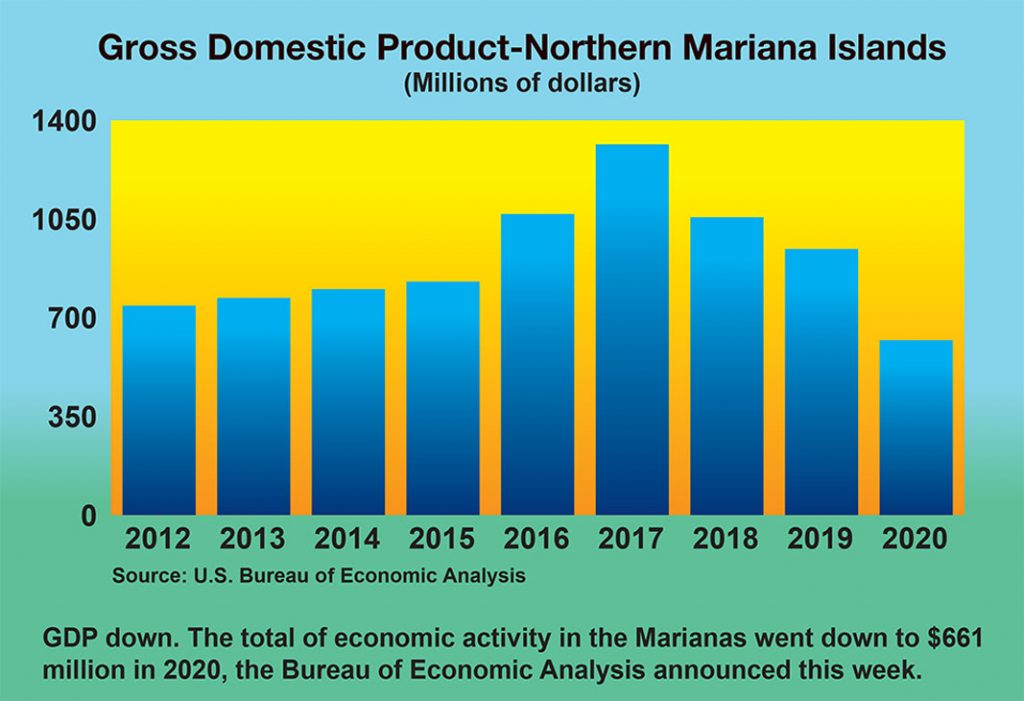2020 worst year for NMI economy
The CNMI’s Gross Domestic Product plunged by 29.7% in 2020 after a steep drop of 11.3% in 2019, according to statistics released Tuesday by the U.S. Bureau of Economic Analysis, with total economic activity in the Marianas going down to $661 million in 2020. Delegate Gregorio Kilili C. Sablan (D-MP) described 2020 as the worst year for the CNMI economy since before 2002.
The BEA said the CNMI economy was substantially affected by the COVID-19 pandemic due to its effects on spending by consumers, visitors, businesses, and governments.
GDP refers to the value of the goods and services produced by the CNMI economy minus the value of the goods and services used up in production. The GDP is also equal to the sum of personal consumption expenditures, private fixed investment, change in private inventories, net exports of goods and services, and government consumption expenditures and gross investment.
The BEA said the decrease in the CNMI’s real GDP reflected decreases in exports of goods and services, private fixed investment, personal consumption expenditures, and government spending.
BEA’s statistics were developed under the Statistical Improvement Program funded by the Office of Insular Affairs of the U.S. Department of the Interior. Due to lags in the availability of data for various components of GDP, the statistics presented last Tuesday for 2020 are preliminary estimates.
In his e-kilili newsletter over the weekend, Sablan said the decline in economic activity in the CNMI was largely due to the COVID-19-related drop in tourism, although a slowdown in construction and reduced government expenditures added to the loss.
Despite the lack of tourists, though, private sector workers’ earnings fell only slightly and compensation to government workers actually went up during 2020, Sablan said.
This helped support consumer spending, which, although also down slightly, got help from the $180 million in Pandemic Unemployment Assistance and Federal Pandemic Unemployment Compensation the U.S. Congress provided in the CARES Act during 2020, he added.
The Guam GDP also went down in 2020, but only by 11.4%. Sablan said the 2021 GDP for Guam, where data is more available, was up 1.1%.
With respect to the CNMI’s GDP, the BEA said the U.S. government passed several laws to support and sustain businesses and individuals through the pandemic. The BEA said expenditures funded by the various federal grants and transfer payments are reflected in the GDP estimates.
However, the BEA said the full effects of the pandemic cannot be quantified in BEA’s statistics for the CNMI, because the impacts are generally embedded in the source data and cannot be separately identified.
Exports of goods and services decreased 74.4%. The decrease in exports was largely accounted for by exports of services, which consists primarily of visitor spending, including on casino gambling.
Statistics published by the CNMI government showed that the number of visitor arrivals to the CNMI decreased by 81.7%, reflecting the effects of the pandemic.
The BEA pointed out that, according to publicly available financial statements, revenues from casino gambling decreased by over 95%.
The BEA said private fixed investment decreased by 42.7%, reflecting a decline in spending on structures and equipment.
Private sector construction activity, including the development of a casino resort on Saipan, decreased substantially in 2020.
Personal consumption expenditures decreased 6.2%, reflecting declines in spending on both goods and services.
Businesses throughout the CNMI operated at a reduced capacity due to the pandemic.
Government spending decreased by 6%, reflecting a decline in federal government spending.
Federal government spending decreased 43% after being elevated in 2019 to support recovery activities following Super Typhoon Yutu.
In 2019, real GDP in the CNMI decreased by 11.3%.
The BEA said the newly available GDP by industry data, which are released on a one-year lag, reveal that the private sector was the primary source of decline in real GDP in 2019. The private sector decreased by 12.4%, reflecting a decline in accommodations, food services, and amusements.
According to publicly available financial statements, revenues from casino gambling dropped by over 80% in 2019.
Additionally, data from the CNMI government show that visitor arrivals declined in 2019.
The government sector decreased 7.2%, reflecting a decline in territorial government due primarily to higher operating losses of government utilities in the aftermath of Typhoon Yutu.
Total compensation decreased from $721 million in 2018 to $700 million in 2019. The $21 million decrease reflected a decline in private-sector compensation.
The BEA said the largest contributor to the decline was accommodations, food services, and amusements.




























